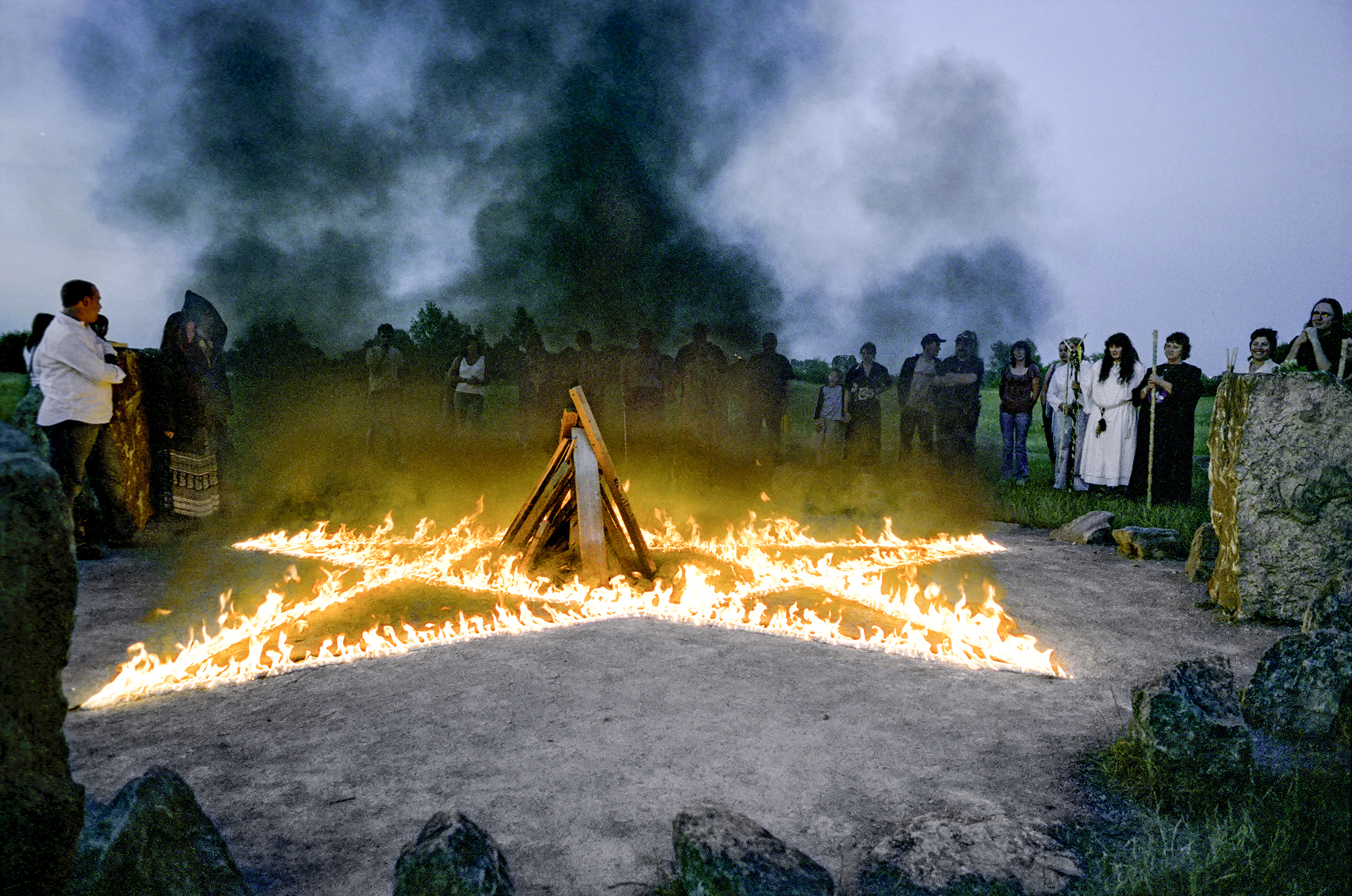Could paganism make a comeback? It's not as crazy as it sounds.
Here's why Europe's old beliefs are not obsolete


We live in a post-Christian era, we're told. But being defined by what you're after doesn't tell us what you're about. Spiritual longings go deep in the human heart — the New Atheists remain much less popular than the self-consciously spiritual Oprah Winfrey — and it remains to be seen to what spiritual calling the current era will respond.
Maybe... paganism?
Every once in a while you see a trend story about pagan revivals. This time, it seems to be going on in Iceland. Ironically, the idea of time going in cycles is a venerable pagan doctrine.
The Week
Escape your echo chamber. Get the facts behind the news, plus analysis from multiple perspectives.

Sign up for The Week's Free Newsletters
From our morning news briefing to a weekly Good News Newsletter, get the best of The Week delivered directly to your inbox.
From our morning news briefing to a weekly Good News Newsletter, get the best of The Week delivered directly to your inbox.
So, could we go back to paganism? This is more than an idle question. Our era is still — much more than we care to admit — very much defined by Christian ideals, which — much more than we care to admit — were very much defined in opposition to pagan ideals. Looking at the pagan worldviews that once ruled Europe should give us some insight into the West today, and, perhaps, its future.
A world full of agencies
As seen in the ancient Greek, Celtic, and Norse traditions, the pagan idea most alien to the modern worldview is probably the belief that the entire cosmos is animated by agencies. The seasons, the tides, the phases of the moon, and so on, all were ascribed to the divine, and to various gods, who could then be propitiated.
The modern scientific worldview seems to make this view obsolete. Now we know that the phases of the moon and the movement of the stars are animated by impersonal forces. Science seems to have drained the world of agency.
A free daily email with the biggest news stories of the day – and the best features from TheWeek.com
The pagan worldview was both enormously exciting and more than a little bit scary. To the pagan mind, the world was alive with energy and intelligence and purpose in a way that might be impossible for us, on the other side of the scientific revolution, to imagine. But this was scary because the intelligences that made the world alive were by no means necessarily friendly. In the ancient world, one was always aware of disease, famine, natural disaster.
But seeing the world as full of agency is by no means incompatible with a scientific worldview. Just because the scientific method treats the world as a mindless machine doesn't mean it is. Thomas Aquinas, the greatest medieval thinker, believed that God's mind was perfectly rational and that he had created the world according to perfectly rational rules, which made scientific inquiry both possible and desirable.
Maybe it is this longing to see the world as other than a dead machine that causes periodic revivals of interest in the paranormal — or in paganism.
An amoral religion
Some modern historians sometimes praise the supposed "tolerance" of paganism, which (see below) was ludicrous. A more accurate description is that paganism was amoral. Paganism, as such, had no explicit moral teachings. It certainly had no teachings against slavery, including sexual slavery, or against adultery, oppression, poverty, or anything else, for that matter. This is not to say that paganism was immoral, or that pagans were more immoral than any other sort of person. It was just that people saw religion and morality as two completely different things.
And the new pagans seem to like it that way. Iceland's pagans celebrate same-sex marriage ceremonies, which I'm pretty sure they didn't get from the Norse sagas or from the mouth of Odin. Browsing through the pop spirituality aisle of your local bookstore (if there are still such things), or watching a Joel Osteen sermon, will remind you how deep the hunger is for an encounter with the numinous that imparts a pleasant feeling without making any moral demands.
A religion of sacrifice
To say that paganism was amoral is really just a first approximation. It had no explicit moral teachings, but, like every human phenomenon, it had an implicit morality.
The pagan worldview was of the cosmos as a fixed totality ruled by fate. The gods as well as people were ruled by fate. Everything was ordered into a hierarchy, from higher to lower essences, with gods at the top, men somewhere in the middle, below that women children and slaves, and below that the rest of the natural world, but all of them ruled by the same system. And fate ruled by an economy of sacrifice.
We who are mostly shielded from its terrors tend to take a romanticized view of nature, but while pagans were sensitive to the beauty of nature, they were also sensitive to its sublime indifference and its extraordinary potential for violence.
For what does natural life do but kill and feed on life? The entire cosmos was a chain of sacrifice, life feeding on itself. The gods, then, were something like cosmic mobsters — a semblance of order, a respite from the powers of fate, could be bought by propitiating the gods through sacrifice, like cosmic protection money. Like mobsters, the gods had a sociopathic streak and might not follow through on their end of the deal even if you held up your own, but it was too risky not to try.
But the meaning of sacrifice was social and political as well as cosmic. In the ancient world, religion was the pursuit of politics by other means. Every office of state was also a religious office, and the city was protected by its deity, which is why sacrilege and blasphemy were capital offenses — by offending its divine patron, you could bring downfall to the entire city. If sacrifice was the meaning of the world, then order could only be brought about by sacrifice.
This was the meaning of scapegoating. Every pagan myth relies on scapegoating — one person has committed a sacrilege, this causes disorder, and order is only reestablished when the scapegoat is killed. Oedipus, King of Thebes, has killed his father and slept with his mother. A plague descends thus on Thebes, but once Oedipus plucks his eyes out and leaves, the plague abates. Of course, in real life, the scapegoat is almost never the actual cause of the disturbance. But to recognize this would threaten the social order, and this is what paganism cannot abide. Indeed, in ancient Rome, executed criminals were sometimes understood as human sacrifices to the gods.
The French scholar René Girard pointed out how the non-pagan myth, the Bible, stood this logic of scapegoating on its end. While the myth of Oedipus tells us that Oedipus was guilty and this is why his punishment was just, the Biblical story of Joseph has Joseph being wrongly accused of another sexual crime — trying to rape pharaoh's wife — and good things happening to the nation only when Joseph is recognized as innocent and vindicated. This anti-scapegoating narrative, of course, reaches its apex in the figure of Jesus, who is scapegoated by every legitimate authority, political and religious, yet vindicated by God through his Resurrection.
This is why paganism and Christianity ultimately were incompatible, and ultimately only one could survive. If the logic of scapegoating is wrong, then paganism is impossible.
Which, again, raises the question: With Christianity seemingly off the stage, is a return of paganism possible?
You might argue that the most successful pagan revival movement in the 20th century was National Socialism. In fact, while the Nazis initially tried to coopt Christianity, their goal was to eliminate it in favor of a reinvented German paganism. (In his boyhood memoir, Joseph Ratzinger, the future Pope Benedict XVI, recounts how his village's authorities, as soon as the Nazis were in power, canceled public celebrations of Christmas and Easter and replaced them with pseudo-pagan rituals of solstice and spring.)
Of course, the Icelanders weaving garlands through their hair are not Nazis, not even close. But it's a useful reminder that some spiritual creeds have their own inner logic that can get the best of us. The scapegoating dynamic can either be exposed or get the better of us, and it's a tragedy that historically Christians have been so liable to it. And we can always use convenient stories to tell ourselves that restoring order through violence is the best thing to do.
And, if God is dead, after all, why not?
Pascal-Emmanuel Gobry is a writer and fellow at the Ethics and Public Policy Center. His writing has appeared at Forbes, The Atlantic, First Things, Commentary Magazine, The Daily Beast, The Federalist, Quartz, and other places. He lives in Paris with his beloved wife and daughter.
-
 Why don’t humans hibernate?
Why don’t humans hibernate?The Explainer The prospect of deep space travel is reigniting interest in the possibility of human hibernation
-
 Would Europe defend Greenland from US aggression?
Would Europe defend Greenland from US aggression?Today’s Big Question ‘Mildness’ of EU pushback against Trump provocation ‘illustrates the bind Europe finds itself in’
-
 The rise of runcations
The rise of runcationsThe Week Recommends Lace up your running shoes and hit the trails on your next holiday
